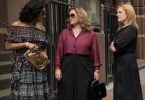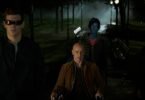
Jacob Tremblay and Brie Larson star in a scene from the movie “Room.” The Catholic News Service classification is A-III — adults. The Motion Picture Association of America rating is R — restricted. Under 17 requires accompanying parent or adult guardian. (CNS photo/courtesy A24)
By John Mulderig
NEW YORK (CNS) – “The mind is its own place, and in itself/Can make a heaven of hell, a hell of heaven.” These words from poet John Milton’s 17th-century epic “Paradise Lost” capture at least one theme of the poignant, multifaceted drama “Room” (A24).
As a tale of confinement and isolation with far-reaching and universal implications, director Lenny Abrahamson’s somber but ultimately hopeful parable might also be said to recall Daniel Defoe’s novel “Robinson Crusoe,” published a little over 50 years after Milton’s classic work.
In lieu of the shipwrecked sailor Crusoe, screenwriter Emma Donoghue’s script, adapted from her 2010 novel, gives us two characters caught in a more modern form of exile: a 5-year-old named Jack (Jacob Tremblay) and his unnamed mother, known to him — and to us — simply as Ma (Brie Larson).
Two years before Jack was born, Ma was kidnapped by a sexual predator they both refer to as Old Nick (Sean Bridgers) who has kept her locked in a backyard shed equipped with an elaborate security system ever since. Born and raised within this confined space, Jack — whom Ma loves deeply, despite the circumstances of his conception — is confused by tales of an outside world he has only experienced through television.
When an opportunity for escape presents itself, however, Jack must rally his courage to seize the moment.
Donoghue and Abrahamson successfully render everyday life as an alien environment for their youthful, bewildered protagonist, who also narrates. Additionally, their film subtly examines human adaptability, the power of imagination and the ironies underlying what appears, on the surface, to be an all-too-straightforward situation.
Viewers of faith will particularly appreciate the movie’s biblical overtones. Besides the fact that the villain’s moniker has traditionally been used as a nickname for Satan, they’ll notice the implicit parallel drawn between Jack’s never-barbered hair and the unshorn, strength-conveying locks of Samson as described in the Book of Judges.
The ruse by which Jack and Ma hope to obtain their freedom, moreover, involves a form of death, burial and resurrection. But if ordinary reality is, in one sense, the heaven to which they both aspire — a point reinforced by Ma’s quiet rendition of the traditional folk song “Big Rock Candy Mountain” — it also represents the fallen world into which they are in danger of passing should they abandon the safe parameters of the titular space.
This skillful interplay of apparently contrary ideas — a redemption and liberation that is also, at some level, the surrender of the main characters’ shared Eden — sets “Room” far above ordinary movie fare. So, too, does the emotional wallop it delivers, thanks in no small measure to Larson’s outstanding performance as well as the deep appeal Tremblay evokes.
Given its moral significance, which also includes an essentially pro-life message affirming Jack’s inherent worth, despite the criminal and tragic nature of his parentage, the picture is probably acceptable for at least some mature adolescents, the elements listed below notwithstanding.
The film contains brief abusive violence, mature themes including serial rape and suicide, an overheard but unseen sexual encounter, a couple of profanities and several rough terms. The Catholic News Service classification is A-III — adults. The Motion Picture Association of America rating is R — restricted. Under 17 requires accompanying parent or adult guardian.






